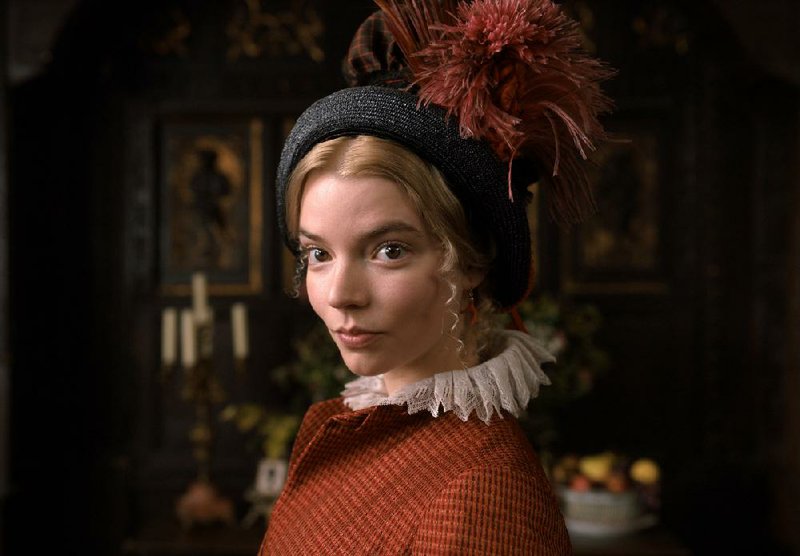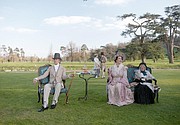Jane Austen endures: one lesson we have learned over the last four centuries, as with Shakespeare and Mozart, the appeal of Austen does not flag. Her novels are tightly wound perfect spheres, filled with delicate, precise machinery that can also somehow withstand a bomb blast at close range.
Such is the perfection of her creations, including Emma, in this case, that you can take the gist and play it as written (1996 Emma, with Gwenyth Paltrow), or fire it up in a contemporary high school (1995 Clueless), and have much of the effect remain perfectly intact.
Emma.
88 Cast: Anya Taylor-Joy, Johnny Flynn, Bill Nighy, Mia Goth, Miranda Hart, Josh O’Connor, Callum Turner, Rupert Graves, Amber Anderson
Director: Autumn de Wilde
Rating: PG, for brief partial nudity
Running time: 2 hours, 5 minutes
The current version with its curious appended period (.), is adapted by director Autumn de Wilde, from a screenplay by Eleanor Catton. This Emma is played by Anya Taylor-Joy, a young actress whose burgeoning career has already included Thoroughbreds, Glass and one of the best horror films of the last decade (The Witch). This performance offers her yet another chance to demonstrate her considerable range; aided in no small part from an estimable, if largely unrecognizable cast.
The opposite of star-studded, the film's talented cast is populated by relatively unknown British actors, which plays very much to the film's strength. Without past associations distracting us, the characters are allowed to fully inhabit the roles unencumbered by previous iterations, which adds a kind of organic texture to the narrative (see also Elisaveta Abrahall's version of Wuthering Heights, which offers a similar sort of vibe).
Austen wasn't a particularly flashy writer, for the most part, save for her wonderfully dense, multi-layered prose, which took the excruciating British indirectness of the upper-class -- that thing where it takes a character an entire bloody paragraph to say "Welcome to my home, humble as it may be"-- and turn that strangled elocution into its own kind of poetry ("Full many a flower is born to blush unseen, And waste its fragrance on the desert air").
For the most part, Catton sticks to the singular prose of the novel (including large swaths of exquisite dialogue taken nearly verbatim), but there's a sly cheekiness to the project, from the way the film portrays the near-hysteric hypochondria of Emma's father, Mr. Woodhouse (Bill Nighy) -- in more than one scene, he literally surrounds himself with standing screens so as to avoid what he insists is a draft, as if ensconced inside his own personal fort -- to adding a small, slightly off-kilter element to the infamous scene in which Mr. Knightly finally declares his love for Emma, "If I loved you less, I might be able to talk about it more," (at the utterance of his declaration, she inexplicably gets a nosebleed).
There is nothing so altered as to offend dedicated Austen-ites (of which my mother is a longtime fervent member), but enough feels new so as to differentiate it from previous versions. As you may surmise, much of these adaptations rely on the fortunes of its titular actress: Paltrow, for all her subsequent goopy abrasions, was actually quite sublime in the role, hitting the right mixture of heady arrogance and shocked shame. For her part, Taylor-Joy is well-adept at capturing Emma's essential nature. She's a good-hearted creature, just too full of her own successes and estranged from potential humility at first to realize her place in the world.
For all Austen's subsequent exquisite flourishes of wit and nuance, Emma was typified very directly: "Emma Woodhouse," she writes, "handsome, clever, and rich, with a comfortable home and happy disposition, seemed to unite some of the best blessings of existence; and had lived nearly twenty-one years in the world with very little to distress or vex her." (The passage serves as this film's epigraph). Emma is a young woman for whom things have gone so wonderfully well, so according to her plan that she hasn't yet realized how little she has actually lived. I suspect part of the novel's enduring appeal is the essential lesson it conveys, applicable to all human beings from every walk of life. Her narrative becomes a guide map of sorts toward the most necessary of adult conditions: empathy.
MovieStyle on 03/06/2020

